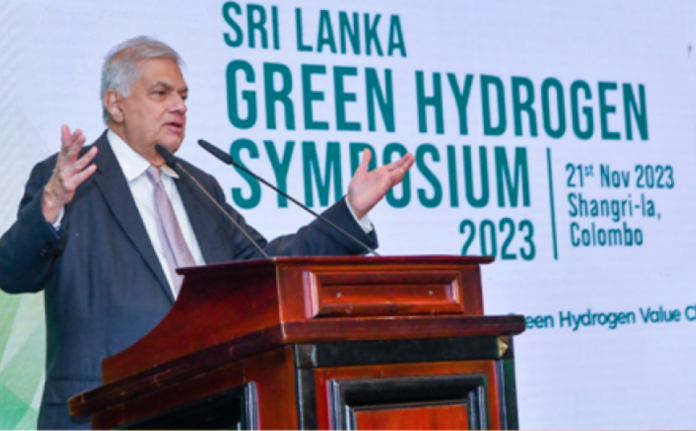In a landmark address at the Sri Lanka Green Hydrogen Symposium 2023, President Ranil Wickremesinghe outlined a comprehensive vision for Sri Lanka’s role in addressing climate change, emphasizing sustainable practices and embracing cutting-edge green energy technologies.
President Wickremesinghe opened his speech by drawing attention to the alarming findings of the UNF emission report for 2023. Expressing concern over the potential 3-degree °C global temperature increase by the end of the century, he underscored the need for immediate global action, lamenting the unfulfilled emission reduction promises of developed nations. “It says by the end of this century we will be about 3 degrees °C higher. Just imagine what that is going to be. And the cuts which were promised by the developed nations have not taken place.
But even with that, we would come to 2.5-degrees °C. So then we have to come down to 1.5 degrees °C. That’s what our target is for 2030.”
Sri Lanka’s commitment to the cause was a focal point in the President’s discourse. He articulated two key objectives: advocating for the 1.5-degree °C target at COP28 and showcasing the nation’s commitment to contributing significantly, irrespective of its lower pollution levels compared to more industrialized countries.
The energy landscape took centre stage in President Wickremesinghe’s address. Citing the UN Secretary-General’s call for tripling renewable energy capacity by 2030, he positioned this as a pivotal opportunity for Sri Lanka to transform into a green energy exporter. The President specifically highlighted the vast potential of solar and wind power in the country’s expansive dry zones.
Using historical references, President Wickremesinghe proposed a bold shift, envisioning Sri Lanka as an energy exporter akin to ancient civilizations exporting grain. “Now we can become an exporter of energy. Let’s go for it. That is my idea,” he declared, underlining the nation’s potential in harnessing renewable resources.
Green hydrogen emerged as a key focus in the President’s vision, with Sri Lanka aspiring not only to achieve energy independence but also to become a regional hub for green hydrogen supply.
To realize these ambitious goals, the President announced plans for a new committee and an energy transition law, signalling a commitment to a holistic decision-making process regarding new energy projects. Acknowledging economic challenges, he stressed the importance of a thorough review to ensure sustained, long-term benefits.
President Wickremesinghe referenced the cancellation of the Norochcholai project in 2002. He pointed out that the decision was made due to economic considerations and the pursuit of a more modern version funded by the Japanese. However, he acknowledged that this decision faced opposition and Norochcholai now poses a challenge for the country, prompting a reassessment of its utility and future role.
The President also expressed dissatisfaction with the downgrading of sustainable energy in favour of other sources, such as wind power. He reflected on the consequences of mismanaging the energy portfolio, emphasizing the need for a holistic view and a re-evaluation of the long-term power generation plan.
In his concluding remarks, President Ranil Wickremesinghe reaffirmed Sri Lanka’s unwavering commitment to green energy and called upon experts to advise the government on the path forward. “We are committed to green energy and we are going ahead,” he declared, positioning Sri Lanka as a leader in sustainable and environmentally conscious policies.
In the meantime, “The Sri Lanka National Hydrogen Road Map” was presented by the Minister of Power & Energy Kanchana Wijesekara to President Ranil Wickremesinghe. This roadmap is a collaborative effort between the Petroleum Development Authority of Sri Lanka (PDASL) and Greenstat Hydrogen India, with the invaluable support of the United States Agency for International Development (USAID),
which charts a course for Sri Lanka’s energy landscape transformation.
Addressing the symposium, US Ambassador H.E. Julie J. Chung, Indian High Commissioner H.E. Gopal Baglay and the British High Commissioner H.E. Andrew Patrick commended on the actions taken by Sri Lanka and pledged their unwavering support for the country’s commitment to Green Hydrogen transformation.
The symposium, organized by Greenstat India in collaboration with PDASL and USAID, serves as a testament to Sri Lanka’s determination to spearhead the transition toward a sustainable and green future, reflecting a comprehensive and forward-thinking approach under President Ranil Wickremesinghe’s leadership.
This event was graced by notable personalities such as Mr. Sagala Ratnayaka; Senior Advisor to the President on National Security and the Chief of Staff, Mr. Sturle Pedersen; Chairman of Greenstat India, Mr. Surath Ovitigama: Chairman of PDASL and Official dignitaries of Greenstat India, USAID, stakeholders and other collaborators.

